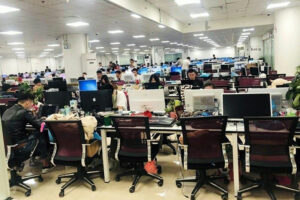By Beatriz Marie D. Cruz, Reporter
OFFICE BUILDING developers may need to adjust rental rates or offer more favorable lease terms to attract tenants and stimulate demand in the current market, according to property services firm JLL Philippines.
“[Developers need] to make sure it’s more attractive to tenants, so there might be an option to either lower rates or optimize their lease terms—maybe offering favorable tenant terms to attract tenants,” Janlo C. De Los Reyes, JLL Philippines head of research and strategic consulting, told BusinessWorld on the sidelines of a briefing on Tuesday.
According to JLL, the Metro Manila market continues to face pressure amid high office vacancies and upcoming supply.
“Vacancy levels [as of the fourth quarter of 2024] rose to around 19.7% due to the moveouts that we’re seeing,” Mr. De Los Reyes said.
In 2024, the Metro Manila office market recorded 407,010 square meters (sq.m.) of moveouts, a 21.54% increase from 334,890.68 sq.m. in 2023.
By sector, the highest moveouts came from the business process outsourcing (BPO) sector at 46.3%, followed by corporate occupiers at 30.8%, and Philippine offshore gaming operators at 22.9%.
“It’s really a mix of different sectors that have downsized, moved out, or even exited the market, contributing to that vacancy level,” he said.
Office vacancy levels may still increase by the end of the year, according to JLL.
“We might see a bit of an increase again by the end of the year, not only from moveouts but also from vacant spaces in existing buildings and new supply coming in.”
In 2025, JLL Philippines expects around 682,023 sq.m. of new office supply with low pre-commitment levels, adding to the total existing supply of 11.1 million sq.m.
Most of the upcoming supply will come from Quezon City (408,001 sq.m.), Taguig City (194,108 sq.m.), Bonifacio Global City (110,582 sq.m.), Makati City (188,821 sq.m.), and the Makati CBD (122,839 sq.m.).
Despite the challenges, JLL remains optimistic about the Metro Manila office sector, citing inquiries from firms looking to enter the market.
“These large inquiries are coming from both BPOs and corporate occupiers, particularly from Southeast Asia and Australia,” Mr. De Los Reyes said.
Last year, gross leasing volumes rose by 27.3% to 583,728 sq.m. from 458,470 sq.m. in 2023.
Corporate and traditional demand (44.6%) led 2024 transactions, driven by the 67,000 sq.m. space take-up from government agencies such as the National Bureau of Investigation, Department of Trade and Industry, and Department of Foreign Affairs.
The BPO sector followed at 40.7% of office demand, with POGOs accounting for 19%.
The Metro Manila office market currently has a total existing supply of 11.1 million sq.m., with about 1.1 million sq.m. of additional space expected through 2028.
RETAILFor the retail sector, JLL noted that the holiday surge and lack of supply drove down prime mall vacancies by an annual 60 basis points to 6.2%.
This also pushed rents up by 2.1% year-on-year to P1,791 per sq.m. per month from P1,755 per sq.m. per month last year.
The Metro Manila retail sector anticipates about 129,380 sq.m. of new supply this year and 283,000 sq.m. through 2028.
“We project vacancy levels to increase to around 7% by the end of 2025. Nonetheless, we expect this to moderate in 2026 as we see a ramp-up in mall development take-up,” Mr. De Los Reyes said.
Meanwhile, international tourist arrivals rose by an annual 9.2% to 5.9 million in 2024, falling short of the government’s 7.7-million target.
From 2019, JLL noted a sharp annual decline of 81.96% in Chinese tourist arrivals to 313,856 in 2024 amid stricter visa rules.
From 2025 through 2029, JLL expects about 2,587 units in the hotel pipeline, with 74% of new supply coming from foreign operators and 26% from the local sector.
